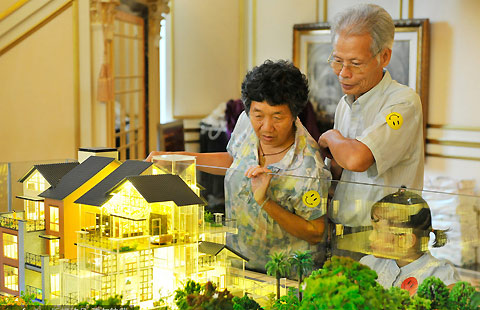China initiates orderly migration of 100m farmers into cities
(Xinhua) Updated: 2014-08-08 16:10After years of rapid urbanization, with 52.6 percent of the population living in cities last year, imbalances have arisen in the process. While more industrialized eastern areas are under increasing environmental strains, middle and western regions are still underdeveloped; the industrialization potential of underpopulated small cities have yet to be realized; and mega cities suffer from excessive populations, causing deteriorating "urban malaise" such air pollution and traffic jams.
For instance, migration has stretched Beijing's capacity to the extreme. According to official figures, Beijing's population increased by 87 percent from 1990 to 2011, reaching 20.18 million. Among the new residents, 7.42 million are migrants. The surge in population means Beijing now has to import its natural gas and fuel supply, as well as 64 percent of its power.
Wang Xiaoguang, an expert with the Chinese Academy of Governance, said differentiated policies could serve the goal of encouraging development of middle and western areas. At the same time, these policies are necessary, given the fact relocating to big cities costs much more.
|
 |
| New urbanization plan ambitious: Analysts |
After 15 years in the booming province of Guangdong, migrant worker Liu Yong finally decided to settle in Longshe Township near his hometown in southwest Chongqing Municipality. Liu, a former villager from Dadi Village, bought a new house in the town in 2010 and relocated his hukou from his rural home to the town.
The reason for his move is simple. Settling down in the nearby town is affordable and allows him to live near his relatives. The same year, the housing price in Guangzhou, capital city of Guangdong, soared beyond Liu' s financial reach.
Chongqing, as one of the two pilot hukou-reform regions in China, abolished its hukou restrictions in 2010. So far, nearly 4 million migrant workers have relocated their household registrations to urban areas, with 70 percent of them choosing to settle in towns and small cities. This shows migrant workers are more likely to relocate to more livable and affordable small cities.
Zhang Xiaode, another professor with the Chinese Academy of Governance, said setting employment and residence requirements for hukou relocation can prevent rural populations from flooding into cities, which could cause slums and widespread unemployment in cities.
According to a survey, about 50 percent of China's migrant workers who have entered cities work in counties and small cities. Keeping this in mind, the government has planned to invest more in infrastructure in small cities so they can attract more migrant workers to settle down.
- China's export beats forecast, surplus at new high
- China launches anti-dumping probe for methyl methacrylate
- Audi faces colossal fines for monopoly
- 1st-tier cities unlikely to lift house market bans
- Cathay Pacific invests in sustainable biojet fuel developer
- China regrets WTO ruling on rare earth
- Government says Apple never on procurement list
- Solar installations rise to 23 GW after additions in H1














